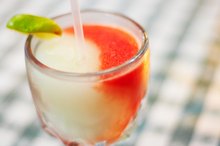How Do You Get Alcohol Out of the Body?
Alcohol is a substance that alters the mind when consumed. There are many reasons for wanting to purge the body of alcohol, such as getting rid of a hangover. There are three ways that alcohol leaves your body: through your breath, sweat and urine. Your metabolism is responsible for breaking down the alcohol and getting it out of your system. Even if you don't have a high metabolism, there are ways to get the alcohol out of your system quickly 1.**
If you are experiencing serious medical symptoms, seek emergency treatment immediately.
Drink one 8-ounce cup of water for every alcoholic beverage you consume. This will give your body time to break down the first drink and hydrate you as well.
How to Get Rid of Alcohol in Your Body
Learn More
Eat a healthy meal before consuming alcohol. The food will soak up most of the alcohol you consume and help your body get rid of the alcohol faster 1.
Take two ibuprofen or acetaminophen and drink 40 ounces of water before going to sleep after your alcohol consumption.
How to Get Rid of Hangover Shakes
Learn More
Drink water first thing in the morning and eat a piece of bread to help absorb alcohol that's left in your system.
Do some light exercise to boost your metabolism and get the alcohol out of your system 1.** If you can walk or run then do so for at least 20 minutes. Work up a good sweat and then take a hot shower.
Continue to drink lots of water and perform moderate exercise for the next 24 hours to rid your body of the alcohol.
Tips
Perform an at-home alcohol test to make sure the alcohol is out of your system.
Warnings
It is unlawful to cheat on drug and alcohol screenings.
Related Articles
References
- Home Booze Kit: How Do You Flush Alcohol Out of Your Body?
- Taylor B, Rehm J. The relationship between alcohol consumption and fatal motor vehicle injury: high risk at low alcohol levels. Alcohol Clin Exp Res. 2012;36(10):1827-34. doi:10.1111/j.1530-0277.2012.01785.x
- Ferré S, O'Brien MC. Alcohol and caffeine: The perfect storm. J Caffeine Res. 2011;1(3):153-162. doi:10.1089/jcr.2011.0017
- Stornetta A, Guidolin V, Balbo S. Alcohol-derived acetaldehyde exposure in the oral cavity. Cancers (Basel). 2018;10(1):20. doi:10.3390/cancers10010020
- Hadland SE, Levy S. Objective testing: Urine and other drug tests. Child Adolesc Psychiatr Clin N Am. 2016;25(3):549-65. doi:10.1016/j.chc.2016.02.005
- Stewart SH, Koch DG, Willner IR, Randall PK, Reuben A. Hair ethyl glucuronide is highly sensitive and specific for detecting moderate-to-heavy drinking in patients with liver disease. Alcohol Alcohol. 2013;48(1):83-7. doi:10.1093/alcalc/ags109
- Fillmore MT, Jude R. Defining "binge" drinking as five drinks per occasion or drinking to a .08% BAC: which is more sensitive to risk? Am J Addict. 2011;20(5):468-75. doi:10.1111/j.1521-0391.2011.00156.x
- American Association for Clinical Chemistry. Ethanol. 2018.
- Cederbaum A. Alcohol metabolism. Clinics in Liver Disease. 2012;16(4):667-685. doi:10.1016/j.cld.2012.08.002
- LabCorp, Inc. Drugs of Abuse Reference Guide. 2007.
- National Institute on Alcohol Abuse and Alcoholism. Alcohol Metabolism: An Update. Alcohol Research & Health. 2007;30(1).
Tips
- Perform an at-home alcohol test to make sure the alcohol is out of your system.
Warnings
- It is unlawful to cheat on drug and alcohol screenings.








